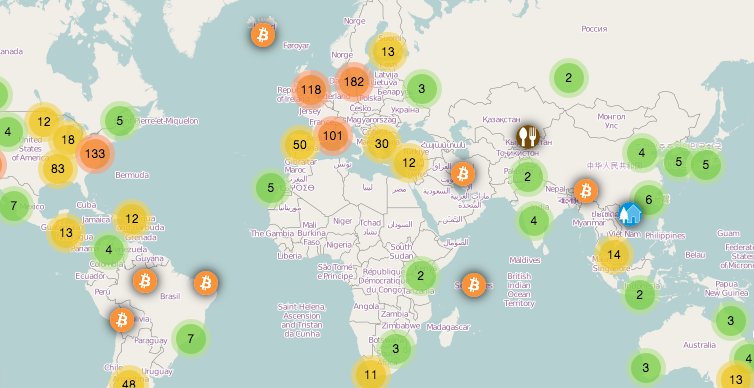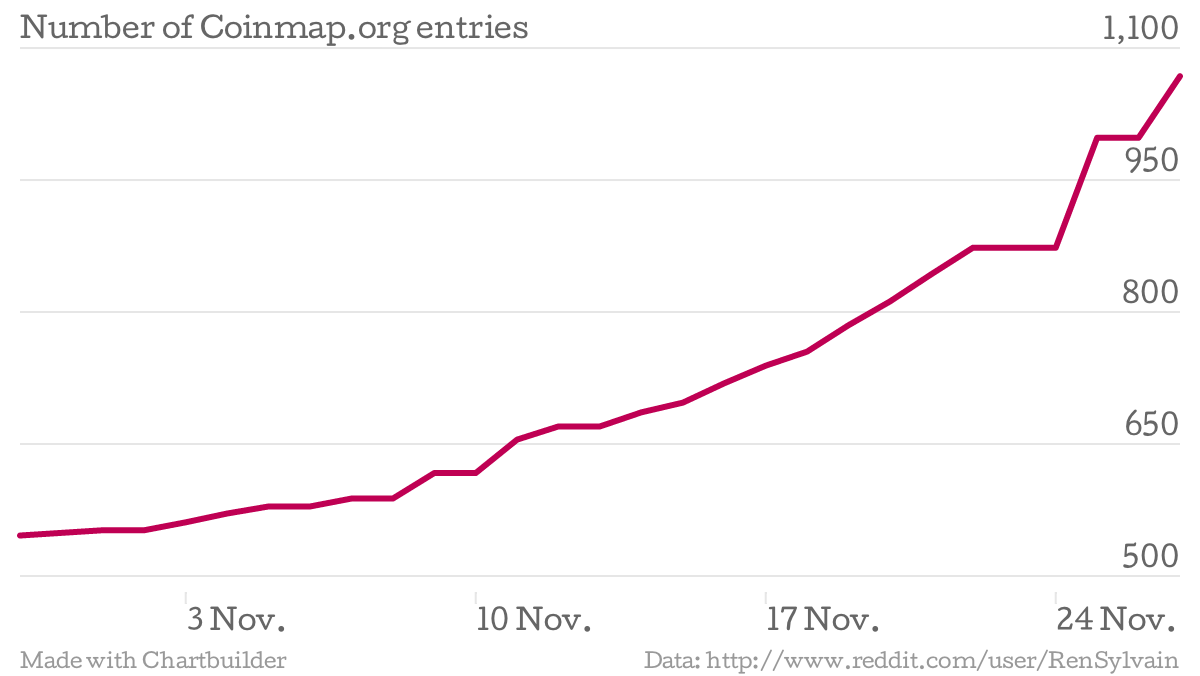
CoinMap: Bitcoin-Accepting Merchants Increased 81% in November
The number of physical locations that accept bitcoin has rocketed, according to statistics from Coinmap.org's crowdsourced map.
At the start of November, the number of entries on CoinMap stood at 552. This has nearly doubled to just over 1,000 current entries. The graph below, based on statistics collected by CoinMap contributor Rene-Lee Sylvain, shows the number of CoinMap entries from the end of October to 27th November.

Graph showing entries on Coinmap.org
These statistics are based on the map's total number of entries, which is displayed publicly on the site. Sylvain said:
All entries on CoinMap are crowdsourced: added either by users who are interested in populating the map, or by bitcoin merchants themselves. For example, a recent addition to CoinMap was VJLoops, a design studio in Valencia. The studio started accepting bitcoins a month ago.
"I believe [CoinMap] is useful, but at the moment it's too early to tell if customers have found me [using CoinMap]," said Kyle Lyons, VJLoops' owner.
Sylvain contacted Rusnak in September, taking it upon himself to promote the site on bitcoin forums and meet-ups in Vancouver. According to him, there were around 200 entries in September.
The number of entries on CoinMap began growing rapidly in October and this has continued into November, Sylvain said. He added:
CoinMap's interface is minimalist. The navigational tools only allow users to move around or zoom in and out of the map. Additionally, there is no search field for specific cities or countries. Instead, users must move the map to their desired location to find businesses that accept bitcoin there.
When the magnification level is sufficiently low, cities will display a green circle that totals the number of entries in that city. Once this circle is clicked, a fairly slick animation increases magnification to reveal all the entries within that city.
Each entry is denoted by a bitcoin icon. If an entry is clicked, a dialogue bubble appears displaying the name of the business, its website and phone number.
In keeping with bitcoin's open-source ethos, CoinMap is built in OpenStreetMap, a free open-source map of the world. Additionally, CoinMap's source code is viewable at Github, so it's available for anyone to work on.
Five contributors have worked on the code so far, although the vast majority of CoinMap's code has been written by Rusnak. Rusnak said that CoinMap may be monetised in future.
"I have some ideas for monetization and I realize that CoinMap could be improved significantly if we could afford an extra developer to work on it," he said.
CoinMap alternatives
Several other maps containing information on physical locations where bitcoin can be spent already exist. According to the Bitcoin Wiki, there are 11 alternatives to CoinMap. One of the most popular alternatives on R/Bitcoin is useBitcoins.info, which boasts 1,412 entries to date.
Unlike CoinMap, useBitcoins.info is built on Google Maps, the search giant's proprietary map platform. The site also carries banner advertisements, although it's unclear if it charges for them. The site's owner has not yet responded to an email seeking clarification at presstime.
Sylvain is an employee at Paradox BTC, a bitcoin exchange based in British Columbia, Canada. He found his way into bitcoin after two years working in a Canadian oil field, operating drilling equipment on the rig. He commented:
Sylvain spent his time in the oil fields researching Tesla Motors, eventually buying stock and turning a profit which he then ploughed into bitcoin.
"CoinMap doesn't look that good, but it's simple. People go on it, look for a place, and there's nothing else they do," he said. "It's probably the optimal way because it's so simple right now."
DISCLOSURE
The leader in news and information on cryptocurrency, digital assets and the future of money, CoinDesk is a media outlet that strives for the highest journalistic standards and abides by a strict set of editorial policies. CoinDesk is an independent operating subsidiary of Digital Currency Group, which invests in cryptocurrencies and blockchain startups. As part of their compensation, certain CoinDesk employees, including editorial employees, may receive exposure to DCG equity in the form of stock appreciation rights, which vest over a multi-year period. CoinDesk journalists are not allowed to purchase stock outright in DCG.

